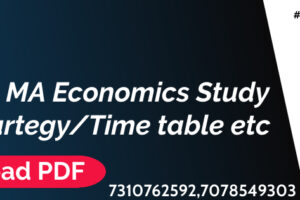CUET-PG Economics Study Material,Study Notes and Books For 2026

The CUET-PG Economics 2026 exam is a golden opportunity for aspirants aiming to secure admission in top central universities for postgraduate studies in Economics. With competition rising each year, a strategic preparation plan backed by the right study material, notes, and books is key to success. This article provides a comprehensive overview of the most recommended books, effective study notes, online resources, and preparation strategies for CUET-PG Economics 2026. Whether you are just beginning your journey or looking to refine your existing preparation, the insights shared here aim to guide you toward academic success and admission to your dream university.
Format of CUET-PG Economics Exam
| Component | Details |
|---|---|
| Exam Mode | Computer-Based Test (CBT) |
| Number of Questions | 75 MCQs |
| Duration | 105 minutes |
| Total Marks | 300 marks |
| Question Type | Multiple Choice Questions (MCQs) |
| Negative Marking | Yes (-1 for each incorrect answer) |
| Medium of Paper | English only |
Recommended Books /Study Material CUET-PG Economics
-
CUET-PG Economics [COQP10] Theory Book Cover All 7 Chapters As Per Latest Syllabus
Original price was: ₹600.00.₹500.00Current price is: ₹500.00. -
CUET-PG MA Economics Question Bank Book With 1500 + Question Answer Unit Wise As per Updated Syllabus
Original price was: ₹700.00.₹499.00Current price is: ₹499.00.
For CUET-PG Economics preparation, choosing the right books and study material is extremely important, as the exam covers a wide range of topics and is quite competitive. To begin with, understanding microeconomics and macroeconomics thoroughly is key. For microeconomics, HL Ahuja’s Advanced Economic Theory is a classic and comprehensive resource, while Hal Varian’s Intermediate Microeconomics is excellent for building conceptual clarity. In macroeconomics, HL Ahuja’s Macroeconomics: Theory and Policy serves well for Indian students, and Dornbusch & Fischer’s Macroeconomics is a trusted reference. Mankiw’s Principles of Macroeconomics is also useful if you’re looking for simple explanations and international perspective.
Mathematics and statistics play a significant role in the exam, so Alpha Chiang’s Fundamental Methods of Mathematical Economics is highly recommended. For statistics, S.P. Gupta’s Statistical Methods is widely used. The basics from NCERT textbooks of Classes 11 and 12 should not be underestimated as they help in revising foundational concepts. For Indian Economy, Uma Kapila’s Indian Economy: Performance and Policies provides an analytical approach, and Ramesh Singh’s Indian Economy is also helpful, especially for current and factual updates. Referring to the latest Economic Survey and Budget is also beneficial for up-to-date economic developments.
In subjects like International Economics and Development Economics, books by Dominick Salvatore and Debraj Ray respectively, are considered standard references. Sodersten and Reed’s International Economics and Todaro and Smith’s Economic Development also offer in-depth knowledge. For Public Economics or Public Finance, H.L. Bhatia’s book remains a preferred choice.
Along with these books, study materials like IGNOU MA Economics notes are highly useful as they are concise and focused on theory. Practicing previous year papers is crucial, as it helps in understanding the pattern and difficulty level. NCERT books can help in clearing your fundamentals, especially if you’re revisiting concepts after a long gap. Online platforms such as Mrunal.org and ClearIAS provide free resources and video lectures that simplify complex economic topics. Regularly attempting CUET-PG mock tests and sample papers available on coaching or educational websites will help you build speed and accuracy.
In terms of preparation strategy, it is important to first build a strong conceptual foundation through reading and then move on to practicing multiple-choice questions and numericals. Time management is key, so creating a balanced schedule that includes theory revision, numerical problem-solving, current affairs reading, and mock test practice is ideal. Making short notes or flashcards for formulas and key terms can also aid in quick revision before the exam.
CUET-PG Economics 4-Month Weekly Timetable
| Week | Focus Areas | Topics | Tasks |
|---|---|---|---|
| Week 1–2 | Foundation | Microeconomics (Consumer Theory, Demand, Elasticity, Indifference Curves) | Read HL Ahuja/Varian, make short notes, practice basic MCQs |
| Week 3–4 | Foundation | Microeconomics (Production, Cost, Revenue, Market Structures) | Solve numericals, revise graphs, attempt 1 full-length mock |
| Week 5–6 | Core Concepts | Macroeconomics (National Income, GDP, Keynesian Theory) | Read HL Ahuja/Mankiw, practice conceptual MCQs, make flashcards |
| Week 7–8 | Core Concepts | Macroeconomics (IS-LM, Money, Inflation, Fiscal & Monetary Policy) | Solve numerical questions, attempt 1 mock/week |
| Week 9–10 | Indian Economy | Indian Economy (Planning, Growth, Poverty, Unemployment) | Refer Uma Kapila/Ramesh Singh, add current affairs notes |
| Week 11–12 | Indian Economy | Sectors of Indian Economy, Reforms, Economic Survey & Budget | Analyze data, write short notes, revise Economic Survey |
| Week 13–14 | Mathematics for Economics | Functions, Limits, Differentiation, Optimization | Use Alpha Chiang, solve practice sets daily |
| Week 15–16 | Statistics for Economics | Mean, Median, Mode, Dispersion, Correlation, Regression | Practice MCQs from SP Gupta or IGNOU notes |
| Week 17 | Public Finance | Budget, Taxation, Deficits, Fiscal Policy | Read H.L. Bhatia, understand graphs and government finance structure |
| Week 18 | International Economics | Trade Theories, BoP, Exchange Rates | Refer Salvatore, solve MCQs, draw diagrams |
| Week 19 | Development Economics | Human Development, Poverty, Inequality, Sustainable Growth | Use Debraj Ray or Todaro, revise keywords and indicators |
| Week 20 | Revision Week 1 | Micro + Macro | Solve previous year papers, revise short notes |
| Week 21 | Revision Week 2 | Indian Economy + Math + Stats | Mixed topic mocks, focus on weak areas |
| Week 22 | Revision Week 3 | International + Development + Public Finance | Flashcard revision, solve 2 mock tests |
| Week 23 | Final Touch | All Topics | Daily revision + 2 full-length mock tests |
| Week 24 | Exam Week | Light Revision | Practice only weak areas, rest well, and manage stress |





